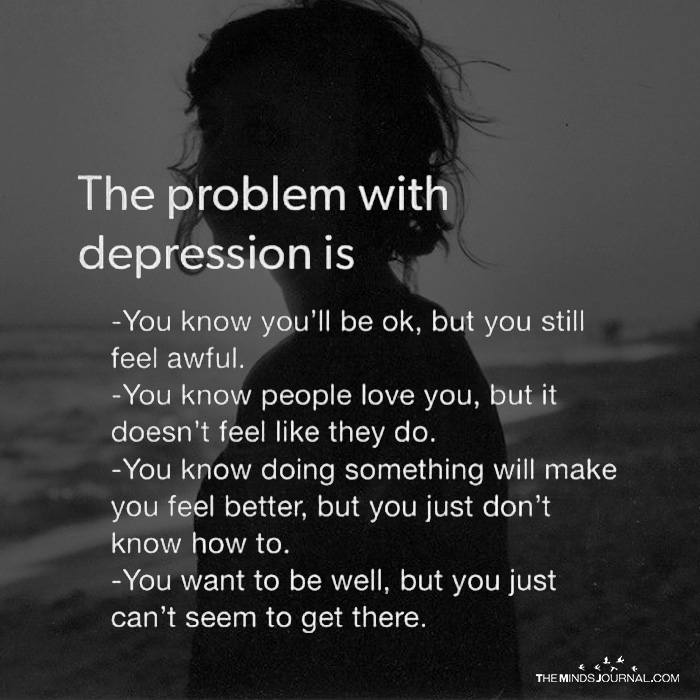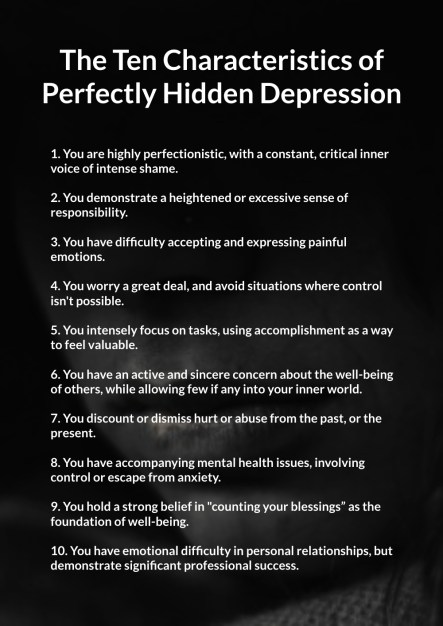What is perfectly hidden depression? How would you know if you’re suffering from it? Perhaps you have a perfect-looking life outwardly, yet inwardly you struggle with a sense of something being wrong, or even more dangerously, you have fleeting thoughts of suicide or escaping your very busy life.
However, you’ve also become an expert at keeping your true feelings from others. You like your feelings being under control. You may be aware you’re intentionally hiding pain (as in what’s termed “smiling” or “high-functioning” depression), but it’s also possible that you have no real clue.
The dynamic may have entrenched itself so far into your very being that you may be largely unconscious of its presence, except for a deep tug in your gut that whispers to you that something’s terribly wrong.
You may have even searched online, trying to understand what that tug could be. You looked at the criteria for depression and when you didn’t fit into them, you might easily have felt shame at how obviously ungrateful you are for your success.
What may be intriguing in the exploration of perfectly hidden depression (PHD) is this question: If you don’t know how to reveal your pain, how do you figure it out yourself? And how would anyone else know?
So, let’s talk about a set of characteristics commonly present in perfectly hidden depression. Remember, PHD isn’t a diagnosis. But perhaps in a grouped set of behaviors and beliefs, or syndrome as it’s called, you’ll find yourself there. And be relieved that finally, there’s a name for what you’ve been experiencing.
Related: 6 Questions To Ask Before You Believe You’re Depressed
10 Commonly Shared Characteristics Of Perfectly Hidden Depression
Following are ten primary characteristics of PHD. They’re not all present in every person who might recognize themselves in PHD. But they’re fairly consistent.
1. You Are Highly Perfectionistic, With A Constant, Critical Inner Voice Of Intense Shame.
Having a perfectionistic streak is one thing. You try to do your best: “If it’s worth doing, it’s worth doing well.” Yet if you silently berate yourself if you’re not at the top at all times, there’s a problem. You may allow yourself one area in which you’re not proficient; for example, you may laughingly admit you couldn’t skate if your life depended on it. Or you can’t tell a joke.
But if it’s an activity or a pursuit that’s meaningful to you, it needs to appear perfect, especially if it’s going to be evaluated or seen by others. You’re the perfect parent, most accomplished lawyer, head of the class, or best friend.
You consistently measure and evaluate your status, and if you’re not meeting perceived expectations, you ramp up the pressure. Inner shame pummels you every hour of every day.

2. You Demonstrate A Heightened Or Excessive Sense Of Responsibility.
You’re very aware of duty, obligation, and loyalty, and can be counted on in a crunch. You’re the first to notice when something’s going wrong and look for solutions.
You’re a good leader, although not the best delegator. This sense of responsibility can turn painful, as you may readily blame yourself, rather than taking a moment to understand the entire picture.
Related: What Being Depressed Looks Like: The Hard-Hitting Truth
3. You Have Difficulty Accepting And Expressing Painful Emotions.
I know when I’m sitting across from someone who may struggle with PHD as I watch them smile brightly at me, while simultaneously describing a significant loss or disappointment. Not always. But it’s a question I begin to ask myself as a therapist.
Anger is avoided or denied. Sadness is banished to the back of the closet. Disappointment is for whiners. You may not even have the words to express these emotions. You stay in your head most of the time, rather than connecting with your heart — analyzing, decoding, thinking through things.
4. You Worry A Great Deal, And Avoid Situations Where Control Isn’t Possible.
You aren’t someone who can stay easily in the present. If you do yoga, you may hate the final position, for which the suggestion is to breathe and relax. You may love to cook, but have a very hard time sitting with guests and enjoying the meal.
The need for control is strong, and so a lot of time is spent worrying about the things that might occur to interrupt that control. Ironically, It’s important to hide this worry. So it might not be obvious to others that it exists. People will shake their heads and wonder aloud, “You never seem to have a care in the world. You don’t sweat the small stuff.”
5. You Intensely Focus On Tasks, Using Accomplishment As A Way To Feel Valuable.
“You’re only as good as your last success.” You count on activity and accomplishment to distract yourself from any inner insecurities or fears that might try to seep out of hiding.

We all do this to a certain extent. If you’re having a bad day, it feels good to get something done. Or you get a promotion at work. Or someone emails you about how your kindness was so meaningful to them. There’s value in purpose and effort.
But you carry it too far. You may not know what brings you a sense of esteem, except for those accomplishments and tasks. And that’s the problem. Your sense of importance and contribution to the world isn’t coming from who you are inherently, only your most recent success.
6. You Have An Active And Sincere Concern About The Well-Being Of Others While Allowing Few If Any Into Your Inner World.
This isn’t fake concern, and it’s not pretend or insincere. It’s real: Caring for others is what you do very well. However, you don’t let others sense any vulnerability. You don’t reveal pain from your past. Your spouse might know, but it’s not discussed. There’s a wall up against anyone discovering that you’re lonely or fatigued, empty or overwhelmed.
This can be especially frightening when suicidal ideation is present. And you can’t let anyone in. Devastatingly, even if you do, you may not be believed. “What, you? Depressed? You’ve got everything in the world going for you.” And that could lead to devastating consequences.
Related: 7 Ways To Feel Better When You’re Feeling Blue
7. You Discount Or Dismiss Hurt Or Abuse From The Past Or The Present.
Compartmentalization is a skill. It’s the ability to be hurt, sad, disappointed, afraid, or angry about something and to put those feelings away until a time when you can deal with them better. Healthy people do it all the time. You can even do it with joy or happiness. Sometimes it’s not the time to burst out singing.
However, if you identify with PHD, you rigidly over-compartmentalize. You’ve developed very strong boxes where you lock away painful feelings, consciously or unconsciously, shoving them into a dark recess of your mind. This allows you to discount, deny, or dismiss the impact of life experiences that caused pain in the past, or the present.
One woman identifying with PHD emailed recently that she’d been diagnosed with PTSD, and that has totally dismissed it. “What happened to me was no big deal,” she wrote. “Much worse things have happened to other people.” That may or may not be true, but pain is still pain.
8. You Have Accompanying Mental Health Issues, Involving Control Or Escape From Anxiety.
You live your life in a very controlled, well-governed fashion. So actual psychiatric diagnoses that might co-exist with PHD might be disorders having to do with control, such as eating disorders and/or obsessive-compulsive traits.
Alcohol or sedative medications could be used to escape anxiety as well.
9. You Hold A Strong Belief In “Counting Your Blessings” As The Foundation Of Well-Being.
I believe in counting your blessings. You bet: It’s healthy, and it can keep you optimistic and grateful. However, if you’ve read this far and identify with PHD, you may feel guilt or even shame if you’re anything but positive.
Expressing compassion toward yourself? That’s out of the question; you’ve got too many blessings in your life. And any suggestion of self-compassion gets designated as whining or complaining. And that’s not allowed.
Related: 10 Hidden Traits Of Being Depressed You Might Not Know About
10. You Have Emotional Difficulty In Personal Relationships, But Demonstrate Significant Professional Success.
The vulnerability that’s found in true intimacy is hard for you. While driven to be productive and achieve, you aren’t likely to be someone who can easily relate on an intimate level. And you may have chosen a partner, who in fact, doesn’t allow vulnerability either, or doesn’t have that capability.
Your relationship will be based primarily on what you do for each other, rather than who you are for each other, with the emphasis staying on the kids, your careers, and being the perfect-looking couple.
If you have any of these ten characteristics, you don’t have to hide. There’s no shame in being human. You can take this questionnaire to see where you might fall in the spectrum of PHD. You can listen to my podcasts on perfectly hidden depression to find out what to do about it. You can realize that there are many others, like you — who are hiding and keeping secrets.
I’ve been writing for over five years about perfectly hidden depression (PHD) and now, New Harbinger Publishing has published my book on this highly damaging syndrome.
If someone you love has these characteristics, please send them this post. They will hopefully feel seen, and loved. It could be the catalyst that would allow them to start a journey that might save their life.
If you’re a therapist, please realize that depression doesn’t always look the same, and doesn’t always present with depressed mood and anhedonia. They can look at you brightly, and say, “You know I don’t know why I’m here.” You have to notice that their smile is a bit forced. Their emotions tightly tucked away.
And the light in their eyes carefully masks the pain that they are so frightened to show.
Check out Dr. Margaret Rutherford’s best-selling book, Perfectly Hidden Depression on Amazon.
Written By Dr. Margaret Rutherford Originally Appeared On Dr. Margaret Rutherford











Leave a Reply